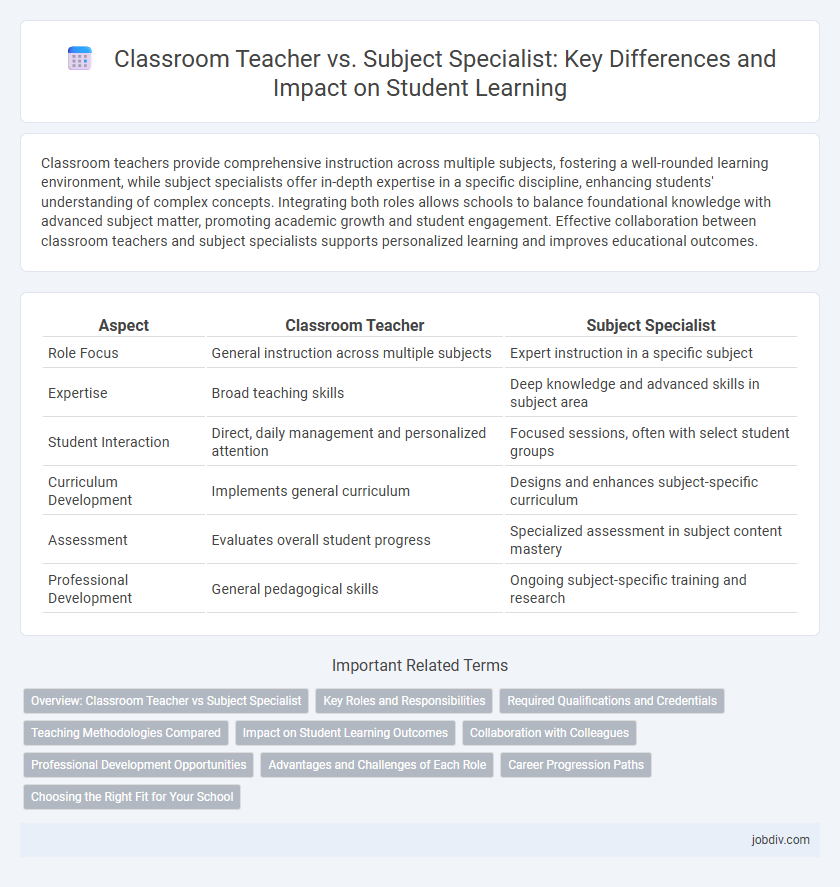Classroom teachers provide comprehensive instruction across multiple subjects, fostering a well-rounded learning environment, while subject specialists offer in-depth expertise in a specific discipline, enhancing students' understanding of complex concepts. Integrating both roles allows schools to balance foundational knowledge with advanced subject matter, promoting academic growth and student engagement. Effective collaboration between classroom teachers and subject specialists supports personalized learning and improves educational outcomes.
Table of Comparison
| Aspect | Classroom Teacher | Subject Specialist |
|---|---|---|
| Role Focus | General instruction across multiple subjects | Expert instruction in a specific subject |
| Expertise | Broad teaching skills | Deep knowledge and advanced skills in subject area |
| Student Interaction | Direct, daily management and personalized attention | Focused sessions, often with select student groups |
| Curriculum Development | Implements general curriculum | Designs and enhances subject-specific curriculum |
| Assessment | Evaluates overall student progress | Specialized assessment in subject content mastery |
| Professional Development | General pedagogical skills | Ongoing subject-specific training and research |
Overview: Classroom Teacher vs Subject Specialist
Classroom teachers manage diverse learning needs and deliver a broad curriculum to a single group of students, fostering holistic development and classroom management skills. Subject specialists concentrate on in-depth expertise in one discipline, enhancing subject mastery and specialized instructional strategies across multiple classes. This difference impacts teaching methods, curriculum focus, and student engagement in educational settings.
Key Roles and Responsibilities
Classroom teachers manage overall student learning by designing lesson plans, assessing student progress, and fostering a supportive environment across multiple subjects. Subject specialists provide in-depth expertise and advanced instruction in a specific discipline, often developing curriculum content and offering targeted interventions to enhance subject mastery. Both roles collaborate to ensure comprehensive education aligning with academic standards and student needs.
Required Qualifications and Credentials
Classroom teachers typically require a bachelor's degree in education along with state-specific teaching certification, emphasizing general pedagogy and classroom management skills. Subject specialists hold advanced qualifications, often a master's degree or higher, in their specific field of expertise and must obtain specialized certifications that demonstrate deep knowledge and proficiency in subjects like mathematics, science, or languages. Both roles demand continuous professional development and adherence to state licensure renewal requirements to ensure instructional quality and subject mastery.
Teaching Methodologies Compared
Classroom teachers employ diverse, integrative teaching methodologies to address multiple subjects and promote holistic student development, utilizing strategies like project-based learning and differentiated instruction. Subject specialists, conversely, adopt in-depth, content-specific approaches emphasizing expert knowledge and advanced pedagogical techniques tailored to their particular discipline, such as inquiry-based learning in science or linguistic analysis in language arts. The comparative effectiveness depends on context, with classroom teachers fostering interdisciplinary skills and subject specialists enhancing mastery and critical thinking within a focused domain.
Impact on Student Learning Outcomes
Classroom teachers play a crucial role in delivering comprehensive instruction across multiple subjects, fostering holistic student development and adapting teaching methods to diverse learning styles, which can lead to improved engagement and foundational skill acquisition. Subject specialists bring deep expertise and advanced content knowledge to specific disciplines, enabling them to provide enriched, in-depth instruction that enhances conceptual understanding and critical thinking within their subject area. The combined impact of both roles enhances student learning outcomes by balancing broad pedagogical strategies with specialized academic rigor, promoting both breadth and depth in education.
Collaboration with Colleagues
Classroom teachers and subject specialists enhance student learning through collaborative planning and shared instructional strategies, fostering a cohesive educational experience. Subject specialists provide in-depth content knowledge that complements classroom teachers' expertise in managing diverse learning needs and classroom dynamics. This collaboration promotes professional growth, curriculum alignment, and improved student engagement across subjects.
Professional Development Opportunities
Classroom teachers benefit from professional development programs that enhance broad instructional strategies, classroom management, and student engagement techniques, fostering versatile teaching skills. Subject specialists gain access to advanced workshops, certifications, and seminars tailored to in-depth content knowledge and latest research in their specific disciplines, elevating subject mastery and pedagogical expertise. Both roles receive ongoing training focused on integrating technology and differentiated instruction to improve student outcomes and adapt to evolving educational standards.
Advantages and Challenges of Each Role
Classroom teachers manage diverse student needs across multiple subjects, fostering holistic development and consistent classroom management, though they may face challenges in depth of subject expertise and workload balance. Subject specialists offer in-depth knowledge and advanced teaching techniques within their discipline, enhancing student mastery but often lack continuity in managing broader student issues and curriculum integration. Both roles require effective collaboration to optimize educational outcomes, balancing breadth and depth in teaching.
Career Progression Paths
Classroom teachers typically advance through roles such as lead teacher, curriculum coordinator, and instructional coach, emphasizing broad pedagogical skills and student management. Subject specialists focus on deepening expertise in specific disciplines, progressing to positions like department head, curriculum specialist, or academic advisor. Both career paths offer opportunities for professional development and leadership, with subject specialists often engaging in research and curriculum design within their fields.
Choosing the Right Fit for Your School
Classroom teachers provide comprehensive instruction across multiple subjects, fostering holistic student development and managing diverse learning needs within a single classroom. Subject specialists bring deep expertise in specific disciplines, offering advanced content knowledge and tailored pedagogical strategies that enhance subject mastery. Evaluating your school's curriculum goals, student demographics, and resource availability helps determine whether a versatile classroom teacher or a focused subject specialist best supports academic outcomes and institutional priorities.
Classroom Teacher vs Subject Specialist Infographic

 jobdiv.com
jobdiv.com